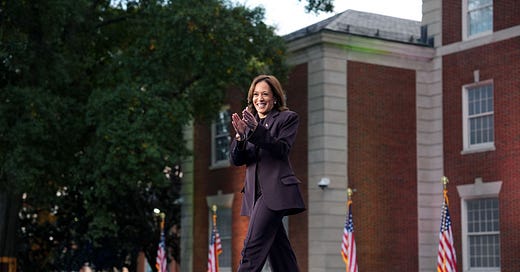
The Free Press

There was a moment last night, shortly before the major news networks begrudgingly announced that Donald Trump had won the state of Pennsylvania, when the journalists manning MSNBC’s election desk began looking a bit uneasy. The writing was on the wall: Kamala Harris was not only failing to win in crucial swing states but hemorrhaging voters in areas that Joe Biden had won by double-digit margins four years earlier. The camera panned from one commentator to the next, as if in search of an explanation, and this was when audiences received a preview of the coping strategy to come.
“I think it’s important to say, anyone who has experienced this country’s history, and knows it, cannot have believed that it would be easy to elect a woman president, let alone a woman of color,” said a grim-looking Joy Reid. “I mean, this was really a historic, flawlessly run campaign.”
Whoomp, there it is.
There were always signs that her supporters were ready to invoke the specter of sexism in the event of her defeat. The idea even got a high-profile test run in October, courtesy of Barack Obama, who scolded black male voters for failing to support Harris in the same numbers as they had supported his presidency in 2008. “You just aren’t feeling the idea of having a woman as president,” he hectored. “I’ve got a problem with that.”
And in the hours since the race was officially called for Trump, the media has continued to double down on the notion that it was sexism that did it.
“I’m not sold on this idea that oh, it was the cost of eggs,” said liberal pundit Juan Williams on Fox News. “I worry that it was, ‘Well, I’m not voting for this woman.’ ”
On MSNBC, Joe Scarborough said the Democrats need to confront some hard truths about their party: “Yes, there’s misogyny. And it’s not just misogyny from white men. It’s misogyny from Hispanic men. It’s misogyny from black men, who do not want a woman leading them.”
A fretful report from The Washington Post described Harris’s defeat as a blow less to the candidate than to feminism at large; after this, one source declared, things will be “so much worse for future generations of aspiring female politicians.”
It’s not hard to see the appeal of this narrative. It displaces blame for Harris’s failure onto everyone but the candidate herself and allows her supporters to claim the moral high ground, in the face of abject defeat. The idea that voters dismissed Harris on the basis of sex rather than the substance, or lack thereof, of her policies means there is no need to consider the campaign’s missteps or how it could do better next time. In this paradigm, Harris was perfect; it’s America that is wrong. And so she lost, yes, but only because the country itself is so full of losers.
To be fair to Harris: Though she campaigned hard for the women’s vote, emphasizing her pro-choice credentials and trying to drum up secret support among the wives of MAGA men, she also successfully—and smartly—avoided the kind of identitarian rhetoric that surrounded her ascendancy to the VP slot. (Biden explicitly said he’d choose a woman to be his running mate.) And it’s worth noting that as of this writing, Harris has not fallen into the Clintonian trap of blaming sexism for her loss at the ballot box. This is to her credit, and I hope she stays the course.
To suggest that Americans balk at the notion of putting women in power is absurd. Hillary Clinton won the nation’s popular vote by a margin of three million just eight short years ago; an elderly Biden easily won the presidency in 2020 despite the very real possibility of his female VP ascending to the Oval Office in the event of his death.
But even more importantly, fitness for office isn’t just about being charismatic and competent enough to win; it’s also about accepting defeat gracefully, without claiming that the system was rigged against you. And much like Donald Trump’s insistence that he would have won the 2020 election if not for widespread cheating by Democrats, the idea that Kamala would have been victorious if not for the moral failings of a misogynist electorate is a lie, and a cope, that has no place in presidential politics.
If you want to become president of the United States of America, then you have to convince Americans to vote for you, full stop.
The truth is, Harris was not a perfect candidate, and she did not run a flawless campaign. We know this because the strength of a campaign is measured in votes, and she did not get enough of them. And the many, many Americans who are willing to vote for a woman—who are excited, even, by the idea of one day seeing one ascend to the nation's highest office—should probably be grateful. Had Harris won, the historic moment would have been tainted by the undeniable sense that her victory wasn’t truly earned. That the first woman to hold our country’s highest office was not fairly chosen as a candidate, but installed by a party that bypassed the normal primary process to fast-track her to the most powerful job in the world—a job she would have won for no other reason than that she was less bad than the other guy.
When we elect a woman president—and I am certain this will happen in my lifetime—let it be on the strength of her character, the wisdom of her policies, the courage of her convictions. Let it be because we chose her to lead us on her own merit. America, and women, deserve nothing less.
Kat Rosenfield is a columnist at The Free Press. Read her piece “The Middle-Class Women Who Are Tripping Balls,” and follow her on X @KatRosenfield.
For more coverage of the 2024 election, click here.
To subscribe to The Free Press, click here:



